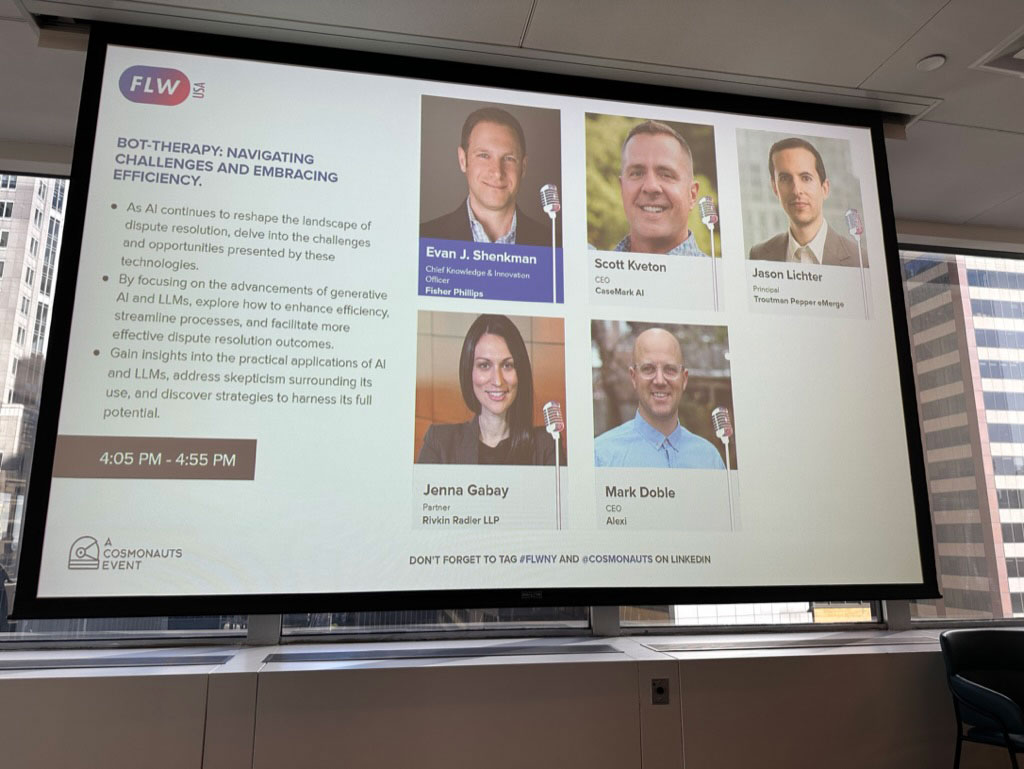AI in Legal: Insights from FLW USA and the Echoes of Early Mobile Revolution
Attending FLW USA in NYC, I witnessed firsthand how AI is ushering in a new era for the legal sector. In this post, I explore these changes, drawing insights from the mobile tech revolution.
The bustling streets of NYC last week were abuzz not just with its typical energy but with insights and innovations from the FLW USA event. With 250 attorneys, countless sessions, and a lot of anticipation around AI, it was a gathering worth every moment. As you can imagine, several of the sessions were heavy on AI content (including my panel). There were some really insightful takes from attorneys navigating this disruptive shift.
Now, as we stand at the crossroads of AI's potential in legal tech, the journey reminds me much of another technological revolution I witnessed firsthand—the mobile wave.
Back when we started Urban Airship, mobile was already ubiquitous. People had mobile phones; in fact, the vast majority of people had phones in their pockets. However, it was the release of the iPhone that opened up a host of new possibilities that just were not in the realm of realistic with the current state of handset technology. The extensible platform, the ability to build customized apps and a whole host of services used to trigger those apps (notifications, location, etc) were just head-and-shoulders above anything else out there. It was the release of the first iPhone that showed a glimpse of what was to come, but didn't necessarily promise a clear path to it, that was breakout moment for the iPhone and then Android. Brands flocked to the iPhone because it was novel and consumers were interested, however, they had no clue how they were going to utilize this new found disruptive technology.
Enter AI and legal. Getting to talk to these attorneys, it feels a lot like the early days of the iPhone:
Exploration Phase
- I heard over-and-over again from people at the event and sidebar meetings in NYC; we're exploring where AI is going to land in our firm. The flock of users to ChatGPT and the sheer amount of press is having second order effects for AI in that it is pressuring legal firms to take a hard look. There were firms that are simply in a wait-and-see stance all the way up to one firm that has built and deployed their own LLM.
Pricing pressure
- Firms (both large and small) are already feeling pricing pressure. ChatGPT adoption and awareness means law firms are already getting signals from their clients that they expect prices to fall. They know the capabilities of this technology and are expecting their law firms to adopt and discount.
Learning Curves
- Despite the promise, many attorneys find platforms like ChatGPT to have a steep learning curve. A few prompts in, and many feel overwhelmed, especially if they aren't tech-savvy. Unless you know what you're doing or the tools have been aligned to your use cases, it's actually non-trivial for people who don't deal in technology to "get" it to do what they want.
Change Management
- Larger firms have a significantly bigger challenge. Implementing AI isn't a switch that big firms can simply flip. Rolling out platforms like ChatGPT to thousands requires careful planning—from integration with existing tools to troubleshooting and organizational support. These questions are still far from answered when it comes to AI.
Proposed Solutions
- Across the board, attorneys agreed that most of the solutions they are being pitched right now are still way too early to deploy at scale. Startups have a tendency to promise the world or to fake-it-until-you-make-it which is fine for things like push notifications or simple tasks but not when it comes to legal issues and AI.
Amidst these challenges and opportunities, CaseMark stands as a beacon for firms navigating the AI wave. We continue to engage attorneys and law firms with tools that help them explore what AI can do while doing it in a safe and secure environment. We only use private instances of LLMs for them to test with, we rope off their data in private containers in Azure or AWS (depending on their choice) and we do our best to learn from their use but not their data.
The future of legal tech is here, and it's brimming with AI-powered possibilities. If you're keen on not just catching up but leading, reach out . Let us show you the wonders of our Workflow platform in a no-obligation demo.





